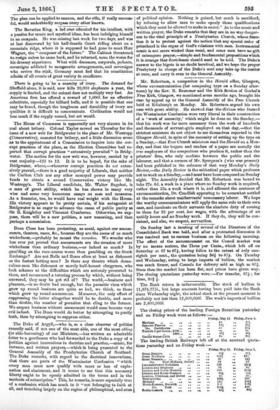The Duke of Argy11,—who is, as a close observer of
politics recently said, if not one of the most able, one of the most abling (or able-becoming) of our Ministers,—has written an admirable letter to a gentleman who had forwarded to the Duke a copy of a fietition against innovations in doctrine and practice,—music, for instance, and written prayers,—which is being presented to the General Assembly of the Presbyterian Church of Scotland. The Duke remarks, with regard to the doctrinal innovations, that there are parts or the Westminster Confession "which every man must now qualify with more or less of expla- nation and abatement, and it seems to me that this necessary liberty ought to be openly admitted in the terms and in the methods of subscription." This, he remarks, is more especially true of a confession which has much in it "not belonging to faith at all, and trenching largely on the region of philosophical, and even of political opinion. Nothing is gained, but much is sacrificed, by refusing to allow men to make openly those qualifications which they must be allowed to make in secret." As to the music and written prayer, the Duke remarks that they are in no way danger- ous to the vital principle of a Presbyterian Church, whose funo- tion it is to protest against the notion that any special order of priesthood is the organ of God's relations with man. Instrumental music is not more wicked than vocal, and some men have no gift of extempore prayer,—simple and fundamental propositions which it is strange that Scotchmen should need to be told. The Duke's answer to the bigots is no doubt heretical, and we hope the proper Presbytery in charge of the Duke's soul may take up the matter at once, and carry it even to the General Assembly.






























 Previous page
Previous page